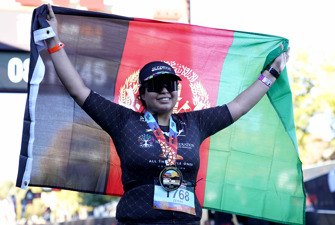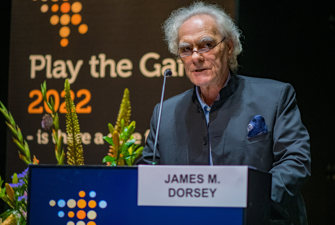Without performance data for trans athletes, only principles guide the discussions
Currently, there is not enough data about the performance of trans women athletes to determine the best course of action in relation to their participation in sports competitions. Instead, the choices stand between inclusion, exclusion, regulated inclusion or making special categories for trans women, participants heard at a Play the Game 2022 session about transgender athletes.
The controversy over transgender women’s participation in female sports competitions made international headlines following two recent events in the world of swimming. In March 2022, US swimmer Lia Thomas was subjected to both acclaim and abuse when she became the first transgender athlete to win a National Collegiate Athletic Association championship, the women's 500-yard freestyle.
In June 2022, the world governing body for aquatic sports, FINA, ruled that only trans athletes who had transitioned before puberty could compete in conventional women’s categories. Both events sparked fiery debate on social media and TV news.
Opponents of trans participation commonly claim that female trans athletes have an unfair advantage. However, according to Swansea University researcher Andy Harvey, accurate performance data is hard to come by and should therefore not be used to guide decisions.
“Policy should be based on actual difference in sports performance, not physiological factors such as handgrip strength,” he said.
“It is important for sports governing bodies hold off on kneejerk policy making, instead they should wait for actual performance data.”
There is not enough performance data to study
However, that wait could take a while. The actual number of trans athletes competing in female competition is “vanishingly small,” said Roger Pielke of the University of Colorado, meaning that accurate performance data may not be available for years.
“If there are not enough athletes to study, that gives us some idea of the scale of the problem. This is only an issue because society has determined it is an issue,” he said.
“The two worst ideas in this debate are unregulated inclusion and total exclusion,” he added. “I think a much better option is regulated inclusion. Not anything goes.”
In Pielke’s view, FINA’s new policy violates existing precedents from the Court of Arbitration for Sport (CAS).
“If a sports organisation cannot show that an athlete has an unfair advantage, the default position should be inclusion. The burden of proof is on those doing the excluding,” Pielke said.
A third category may be the safest way to go
Rikke Rønholt Albertsen, former athlete and member of the Danish NOC, agreed that sport should be as inclusive as possible.
“If the game isn’t fair, people will walk away” she said. “We need to represent all of society or we will lose legitimacy.”
However, if the alternative was a requirement that trans athletes adhere to specific medical thresholds, she added, a third competitive category might initially be the safest way to go, with trans women competing in women’s events for separate prizes.
“We need to err on the side of inclusion. However, Lia Thomas suffered because we erred on the side of inclusion. We are already ‘othering’ trans athletes by having this whole debate. I think that the whole polarised debate is hurting them more,” she said.
Spencer Harris of the University of Colorado detailed a recent study of current legislation by US states on transgender issues and found it largely followed party political lines.
“The legal situation is very messy in a US political context. This isn’t about sport, it is about politics, and it is a deeply divisive issue. I think this issue is destined to end up in the Supreme Court,” he said.
Magali Martowicz, the IOC’s head of human rights, detailed how the IOC’s new Framework on Fairness, Inclusion and Non-Discrimination moves away from a “one size fits all” eligibility criteria based on testosterone levels.
Some people are actually born with natural sex variation, she pointed out, and a person’s sex characteristics define their gender. She added that the IOC is striving to reach a fair balance between inclusivity and preserving the integrity of its competitions.







